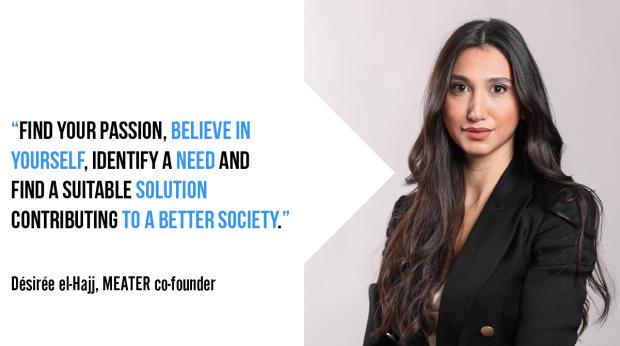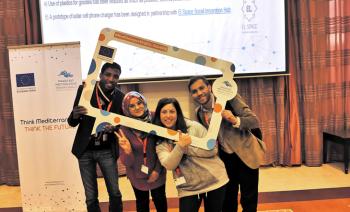This article is also available in French and Arabic (external website) or Download PDF.
Southern Neighbourhood women have an important role to affect change in their communities through science, technology, engineering, and mathematics. The EU supports young entrepreneurs and researchers to boost the region’s economic development.
Although girls have more opportunities to access higher education than ever before, UNESCO warns that – globally – only 35% of science, technology, engineering, and mathematics (STEM) students are women. Even Southern Neigbourhood women, with a higher rate of 57% students in the field, struggle to make a living out of the laboratories.
On the International Day of Women and Girls in Science, Capacity4dev highlights the EU co-funded project THE NEXT SOCIETY and its experience removing the barriers to innovation in the region.
THE NEXT SOCIETY initiative lessons learnt:
This open community1 from Europe and Southern Mediterranean countries2 has been supporting, since 2017, the emergence of talents and innovative leaders while aiding their development, to attract the private sector. What can we learn from all these years implementing the THE NEXT SOCIETY initiative?
- Involve women as major driver for value creation in the region;
- Address national constraints for economic development;
- Build strong partnerships for sustainable change.
1. Involve women as major driver for value creation in the region

THE NEXT SOCIETY initiative is not an exclusive programme for women. However, “30% of entrepreneurs supported are women, and more than 44% joined our Tech Booster programme, which supports researcher-entrepreneurs,” explains Zoé Luçon, senior expert from the programme.
Zoé Luçon continues, “many women are working at the labs in the Southern Neighbourhood region, but very few are creating start-ups. THE NEXT SOCIETY initiative balances this trend to enhance the status of research outputs – which represent a major driver for value creation in the region – and create new job opportunities for women.”
In Lebanon, where the ecosystem for entrepreneurs Berytech coordinates this regional programme, Désirée el-Hajj benefitted from technical assistance to set up the business plan to bring her innovative idea to the market. MEATER was created by this doctor in nutrition and microbiology with professors Dolla Karam Sarkis and Joseph Matta of Saint Joseph University in Lebanon, in partnership with the Industrial Research Institute of Lebanon. MEATER is a device capable of distinguishing frozen-thawed from fresh meat to protect consumers’ health and prevent food poisoning.
In her experience, “I have never been discriminated against for being a woman. Not during my studies or research, but I have noticed during the technical development of our prototype that this is a more male-dominated environment.”

More than 30% of entrepreneurs supported by NEXT SOCIETY are women.
How do you empower in your projects women and girls in science?
Yamina Bouchikh is an ecological engineer and researcher at the National Institute of Agronomic Research of Algeria. Working with microbiologists, she founded TANMU – a start-up using bacteria as an alternative material to produce leather. After three years of researching this eco-friendly product, she decided to apply to THE NEXT SOCIETY initiative to improve her business strategy. She explains, “I have a young girl, and that limits my capacity to travel to meet investors or to work late often. This not only limits my business, but on the contrary forces me to be more efficient in my work and smarter in time management to achieve my goals”.
Supporting researcher-entrepreneurs is a great way to achieve a good gender balance in entrepreneurship programmes as there are more women in Southern Neighbourhood labs than the global average.
2. Address national constraints for economic development

Yamina Bouchikh, however, believes the most significant challenge to developing her start-up is going international. “My product aims to reduce the pollution and the water consumption needed to produce leather. Also, to address the deforestation problem related to animal breeding used by this industry. Therefore, my clients are from the fashion industry,” she continues, “my main market is France and other European countries already implementing alternative materials to produce leather. For this reason, to succeed, I would need to set up a business in Europe.”

THE NEXT SOCIETY approach is to support local innovation to benefit the region.
How are your projects supporting local innovation?
THE NEXT SOCIETY initiative addresses this challenge, shared by many Southern Neighbourhood entrepreneurs, by assisting entrepreneurs and researchers at national and regional levels, developing soft landing3, international acceleration boot camps and market development missions. Furthermore, the project establishes partnerships with tech hubs and synergies with other programmes to facilitate the implementation of these innovative ideas in Europe4.
Désirée el-Hajj believes in the benefit of MEATER for Lebanon and emerging markets globally, “our goal is to engage regulatory authorities and distributors in Lebanon,” she explains. Moreover, “other countries would also benefit from improving food security and safety, as more informed food choices lead to reduced risk of disease while lowering the economic burden on the public health system.”
3. Building strong partnerships for sustainable change

Research and innovation require time. Désirée el-Hajj knows it well, “after three years of research, we still needed another year to develop a successful prototype. During this process, our team tested our protocol with more than 150 samples of red meat, poultry and fish.”

Strong partnerships are crucial to address the challenges of the project.
How do you build strategic partnerships in your projects?
Developing a start-up also requires trust and strong partnerships to create the right ecosystem for investment and connections, especially for science-based start-ups. Researchers also face a lack of visibility and trust from the private sector. Yamina Bouchikh explains, “there is a gap between researchers and the private sector. The first focus on the labs and scientific papers produced per year, while the second often funds more mature businesses. Funds are needed to continue our research and development, especially for the industrial prototyping phase.”
THE NEXT SOCIETY initiative works with strategic networks of angel investors in Europe, local partners, and the Maghreb diaspora to ensure a sustainable environment in which innovation can flow. The project also combines its activities with other projects focusing on innovation in the Southern Neighbourhood region.
Final thoughts
The Southern Neighbourhood region is at the heart of some of the most challenging environmental threats. These include water scarcity, arable land depletion, air pollution, inadequate waste management, loss of biodiversity, declining marine resources and degradation of coastal ecosystems. Women researchers are part of the solution, and innovation is crucial in developing the regional economy.
Click on the play button below to watch our video about THE NEXT SOCIETY.
|
More about THE NEXT SOCIETY initiative:
|
Recommend this article if you think it will be helpful for your peers
The Women in Science Campaign
This article is part of a broader 'Women in Science' campaign which will be launched on February 11th and runs until March 8th, which marks International Women's Day (IWD). The campaign will focus on debunking myths about women in science, by showcasing success stories of outstanding women specialized in various scientific fields. Throughout the remaining weeks, the EU Neighbours South will publish a series of 'e-cards' profiling 9 women from 9 of the Southern Neighbourhood countries, alongside a series of testimonies and statements from EU representatives, including Luis Miguel Bueno Padilla, the Spokesperson in Arabic for the MENA region and women with a scientific background, contributing to EU-funded projects and who have made a difference thanks to their know-how.
Credit: Video © Capacity4dev | Photo European Union 2017 - 2020 / Johanna de Tessieres
1 The Next Society project involves changemakers, entrepreneurs, investors, corporates, NGOs, public and private innovation, research and economic development hubs.
2 The seven Southern Mediterranean countries are Algeria, Egypt, Jordan, Lebanon, Morocco, Palestine and Tunisia.
3 The aim is to help foreign companies to quickly and comfortably start and develop their business activity.
4 The Next Society Project does not provide visas to the Schengen area.





Log in with your EU Login account to post or comment on the platform.